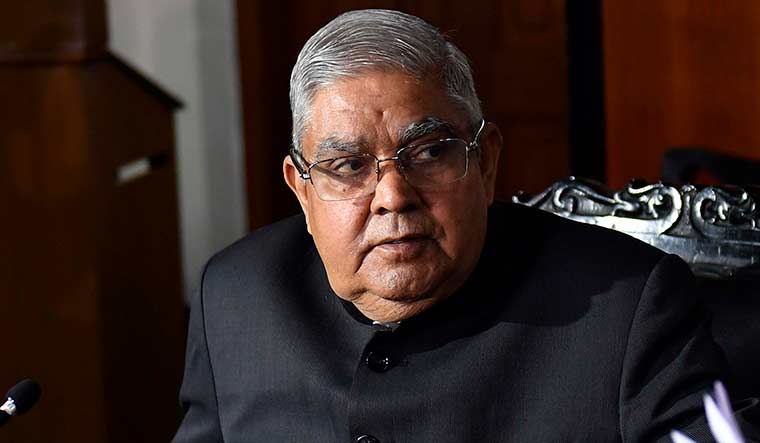West Bengal Governor Jagdeep Dhankhar expressed displeasure over the recent decision of Mamata Banerjee government to revise the annual confidential report (ACR) of West Bengal civil service executive officers—additional district magistrates, sub-divisional officers and block development officers—to bring them under the direct control of the chief minister instead of the chief secretary.
In an exclusive interaction with THE WEEK, Dhankhar said the decision has led to politicisation of bureaucracy in the state. “On June 26, the chief minister took an unprecedented step to tighten political caging of lower bureaucracy. It has revised the format of the annual confidential report (ACR) of West Bengal civil service executive officers such as additional district magistrates, sub-divisional officers and block development officers to bring them under the direct control of the chief minister,” he said.
He claimed that such a move is aimed at politicising the relief works (COVID-19 and cyclone) being carried out and making the officers subservient to the party.
Dhankhar said appraisals of bureaucrats should not be done by the political representatives, even if it is the chief minister. Instead, the chief secretary and other senior-most officials in the state bureaucracy should be doing it, like other states.
The governor claimed that with this move, politicisation of administration in the state is complete. He said during the last assembly election, the state witnessed a section of officers acting at the behest of the ruling party.
It is to be noted that the politicisation of bureaucracy did not begin during the tenure of Mamata Banerjee. During the last leg of the left rule, the then government changed the ACR rules for the senior IAS officers and principal secretary. Former chief minister Buddhadeb Bhattacharjee began doing their appraisals instead of the chief secretary.
The chief secretary continued doing the appraisals of the lower ranking officers, as recommended by the district magistrates. In 2013, with a special order, Mamata Banerjee took away that power of the chief secretary and brought the appraisals of
DM, SP and other IAS and IPS officers under her control. With the June 26 move, appraisals of all civil servants are now done directly by the chief minister.
According to senior officials, when the left government took the decision, IAS officers began to cosy up to the political bosses and even CPI(M) leaders. Besides, the control of senior officials over their juniors began to loosen and corruption began to increasingly plague bureaucracy.
With Banerjee’s decision, as the governor has rightly pointed out, political leaders will now begin to have more control over the bureaucracy as even the lower ranks officers, who implement government orders at the ground level, will become political tools for the ruling party.
“This has ruined the Bengal, if you ask me. Bengal has become more violent and politically disturbed,” said a former IAS officer, who retired recently.
“The chief minister has unleashed a mechanism where extra-constitutional authority is in the virtual seat of governance today,” Dhankhar said, and added that there have been rumors of a scam in the purchase of COVID-19 equipment with bureaucratic involvement.
“Such a decision of politicisation of state bureaucracy has stunned me. It is unfortunate that the government takes decisions for party workers and not for the public,” the governor said, and added that such a move will give rise to authoritarianism.
“This is not there in any other state. Such kind of authoritarianism is at its peak in Bengal,” said Dhankhar.
No senior officers of Bengal wanted to comment on the issue when THE WEEK reached out to them.



